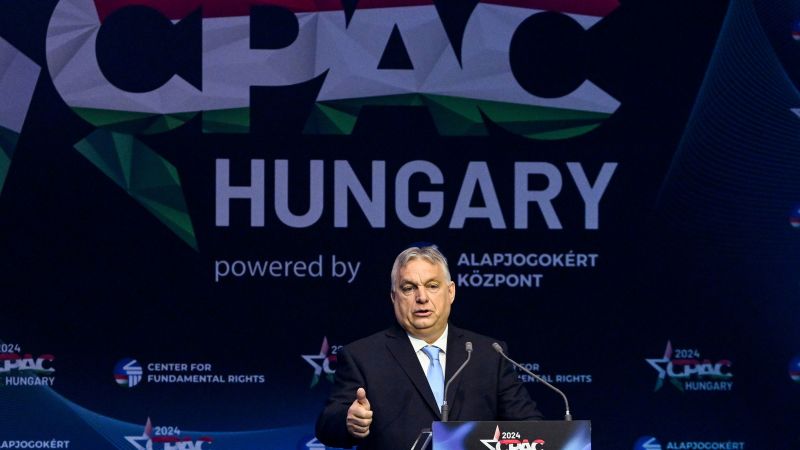At a conference hall festooned with slogans like “Let’s drain the swamp,” a steady stream of Republicans voiced their support for tough immigration policies, restrictions on LGBTQ rights, and a fierce stand against “woke ideology.” It might have been any recent GOP gathering in the U.S., but this event was thousands of miles away, at the Conservative Political Action Conference’s annual meet in Hungary.
The Republicans’ admiration for Prime Minister Viktor Orbán and his authoritarian government underscores how this small Central European nation has become an improbable template for a potential second Trump term. This shift comes despite significant criticism from international observers about Hungary’s troubling drift away from democratic norms.
The American right’s newfound affinity for Orbán’s regime is not just ideological; it builds on millions of dollars spent by the Hungarian government on U.S. lobbying and emerging links between Hungarian and American conservative think tanks. During his opening speech at the conference, Orbán threw his support behind former President Donald Trump’s reelection, likening upcoming elections in the U.S. and European Union to a military campaign.
“Make America great again, make Europe great again!” Orbán proclaimed in English, then switched to Hungarian: “Go Donald Trump! Go European sovereigntists! Let us saddle up, don our armor, take to the battlefield, and let the electoral battle begin.”
Trump, who hosted Orbán at Mar-a-Lago in March, sent a video message praising Orbán as “a great man,” commending the Hungarian attendees for “fighting on the frontlines of the battle to rescue Western civilization.” This mutual admiration is part of a broader trend where Trump allies are drawing inspiration from Orbán’s approach as they strategize for a possible Trump presidency. Steve Bannon, Trump’s former chief strategist, described Hungary as “an inspiration to the world” and called Orbán “one of my heroes in the world today.”
Since returning to power in 2010, Orbán has transformed Hungary into a testing ground for conservative policies, simultaneously eroding democratic principles, according to critics and EU officials. His government has dismissed judges, altered election rules to benefit his party, cracked down on NGOs, and appointed loyalists to key institutions. Hungary’s hardline stance on immigration, LGBTQ rights, and media control are just a few examples of Orbán’s heavy-handed governance.
These policies are exactly what some Trump supporters would like to see in a potential Trump administration. Orbán’s government built a fence along Hungary’s southern border in response to the 2015 migrant crisis, tightened immigration laws, and promoted a Christian nationalist view of society that limited LGBTQ rights. These moves have resonated with certain factions within the American conservative movement.
CPAC Hungary, an offshoot of the iconic American conservative conference, is one way Orbán’s government has forged ties with American conservatives. It drew conservatives from the U.S., Europe, and beyond for the two-day event, which took place in a conference center by the Danube River. Posters with Trump-friendly slogans like “Let’s drain the swamp!” and “We win, they lose” adorned the venue, and one attendee sported a shirt depicting Trump and Orbán as “saviors of the world.” Security guards told reporters to stop filming in the park, and organizers denied CNN and other independent news outlets access, saying it was a “NO WOKE ZONE.”
Despite Orbán’s authoritarian tendencies, three Republican members of Congress spoke at the event, and others, including Kari Lake, Mark Meadows, and Steve Bannon, sent video messages. Rep. Andy Harris of Maryland praised Hungary’s “successful models” of conservative governance, while Arizona’s Rep. Paul Gosar endorsed Hungary’s immigration policies, hoping the U.S. might follow suit.
The Orbán government’s engagement with American conservatives extends beyond CPAC. Since his 2010 return to power, the Hungarian government has paid at least $4.4 million to American lobbyists, as revealed by DOJ filings, to meet with Congress, promote Hungary’s policies, and coordinate appearances on right-wing U.S. media. Moreover, pro-Orbán groups have established unreported connections with American conservative activists, funding figures like Christopher Rufo, known for his anti-critical race theory campaigns.
Two American nonprofits actively working on policies for a potential second Trump term have also shown interest in Hungary’s approach. The Heritage Foundation, with its 900-page policy roadmap “Project 2025,” and the America First Policy Institute have collaborated with Hungarian government-funded think tanks, arranging visits to Hungary to study its policies.
For those in Hungary who oppose Orbán’s regime, this close relationship with the American right is concerning. Zsuzsanna Szelényi, a former party member turned pro-democracy advocate, warned that Orbán’s policies have eroded fundamental rights. Márton Gulyás, a left-leaning political commentator, criticized Orbán for using divisive rhetoric about LGBTQ issues and migration to distract from the country’s failing institutions.
Despite these critiques, American conservatives visiting Hungary seemed taken with its strict policies and perceived orderliness. Conservative strategist Joey Mannarino noted in a social media video the apparent absence of homelessness and crime in Budapest, declaring, “We need to figure out whatever this country did, and we need to get it back.”
While Orbán’s Hungary has become a model for some American conservatives, his critics urge a different perspective, seeing in his policies a warning sign of democracy in peril.















































